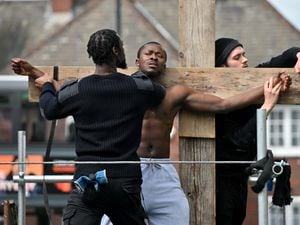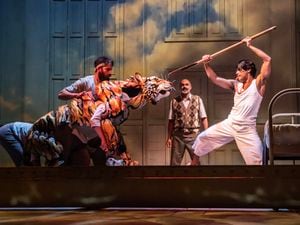Weekend's 5th birthday: Look back at our star interviews including Rod Stewart, Noel Gallagher and Paul Weller
To mark our fifth birthday, we thought we’d do what all people do on their birthdays: lie about our age and reminisce wistfully about the things we’ve learned.
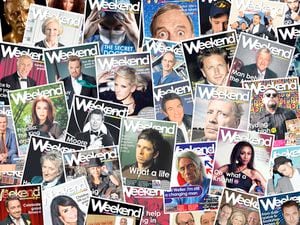
So, to mark our, erm, second birthday, we’re delighted to share the collective wisdom of some of the world’s biggest stars.
Ladies and gentleman, pour yourself a cuppa, crack open the M&S biscuits, put your feet up on the pouffe – and enjoy this one-time-only, never-to-be-repeated edition of Weekend Greatest Hits – Now That’s What I Call A Brilliant Supplement.
Sir Rod Stewart shared with us his love of cocaine, leggy blondes and model railways. Of the reported 1,000 women that he’s slept with, he told us: “The most memorable is always the current one. The rest just merge into a sea of blondes.” And of his marvellous collection of toy trains, he said: “Trains are when I get time for myself. That was something that I was very much into when I was a young kid. My dad bought me a guitar instead of a railway station that he promised he’d buy me. But, yes, it’s a wonderful form of escapism. I’ve finished the lay-out after 23 years. It’s kept me out of most trouble.” In fact, Sir Rod loves his trains so much that he takes a few with him on tour, booking them a room of their own so that he can play with them before a show: “The one thing about touring is that there’s a lot of downtime and you feel like you’re wasting your life. I’d have a spare room in the hotel and I’d pass away five or six hours. I was wonderfully content. It wasn’t always that way. Before the trains it was always sha**ing and drinking.”
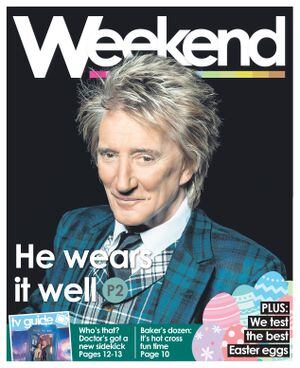
Noel Gallagher surprised us all with his intimate knowledge of Wolverhampton. “Wolverhampton Civic Hall? Let me see. I actually remember a gig there when I went to see Paul Weller once. Goldie introduced him on stage: Goldie, of all people. The lads from UB40 were there for some reason. I remember that gig more than the times I’ve played there.” And, of course, he made time to tell us about his own genius – one that helped him to write and record the era-defining Britpop soundtrack (What’s The Story) Morning Glory? – as well as drugs and hanging out in the same studio as The Beatles. “It was cool to record in Studio Two at Abbey Road. It’s an amazing thing to stand in that room and think of all the drugs that have been taken in that room. Nah, you know, it’s not just about the studio. Listen, if you go to Abbey Road and have a s*** song it’s still going to sound s*** even if you record it in the same studio that The Beatles and The Stones used. But it’s nice to stand there and think John Lennon and Mick Jagger and all those great cats from the 1960s literally stood on the same spot. That’s why it’s great. It’s a fantastic atmosphere in the room. It can make you feel nostalgic. I’ve done some s*** stuff and I’ve done some great stuff there. I was lucky enough to record in there with Paul McCartney and Paul Weller at the same time. You know, that was a great day out.”
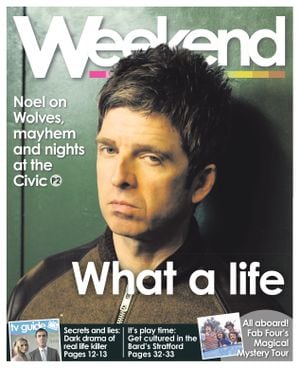
Paul Weller led us into his dressing room before a gig in Stoke-on-Trent and offered a cup of tea and a handful of hazelnuts. He also explained why he will forever be The Changing Man. “I was brought up on The Beatles. They were amazing songwriters, but the thing with The Beatles was that every album was always different. They took you somewhere else and moved it along. So in my own little way, I’ve always thought that’s what you’re supposed to do as an artist. You’re supposed to keep pushing it along and keep moving with it. I also think it’s boredom. I get bored just doing the same thing. So I’m always looking at how we can do things different and keep changing things.” Remarkably, he even spoke about The Jam, though not for long: “I look back on The Jam and The Style Council and just smile. A lot of it was great. The Jam was my teens, really. It was all a learning curve. I just think of all the knowledge I acquired along the way.”
Sting took us back to his youth when he allowed us into his dressing room in Newcastle. The Englishman In New York had written a play, The Last Ship, and spoke about the way his childhood had influenced his latter years. “I was siphoned off into the Grammar school at 11. I passed the 11-plus and I was separated from that community. It was quite a violent separation. So, in a way, this play is me trying to make my way back and honour the community that I came from, willingly, but that none the less was troubling. By then, I’d already realised I didn’t belong. I saw myself as a ship. I was launched, I was out of there. I wasn’t coming back. And then, of course, I’m back now. I’ve reached that point in my life where I can do that. My job is to tell the story.”
Sir Michael Parkinson told us that even though he’s into his 80s, the idea of retiring never enters his mind. He did, however, lament the lost days of talk shows on our TV screens. “I fear that I sound like an reactionary old fart when I say that I wish we had at least one talk show nowadays that tried to do what I did but sadly the taste is solely for comedy talkshows. That’s not to say they are not good and, in the case of Graham Norton and Jonathan Ross very good, but I just think there is an audience out there that craves a different diet of talk from what is being served up.” And as well as talking about such greats as Muhammad Ali, he reflected on the ones that got away – Rod Hull and Emu and the disastrous Meg Ryan: “I knew what to expect with Rod. That was his act. I went with it knowing that the audience love it when the host gets his comeuppance. Meg was different. An interview is a collaborative process. If one side doesn’t want to do it then it does not work. For whatever reason she didn’t want to be interviewed and in retrospect, for both our sakes, I should’ve ended the interview when she said ‘just wrap it up’.”
The late Sir Roger Moore confessed to being a victim of domestic violence when we spoke to the former 007. He revealed the favourite part of his James Bond years was working with a team he treated like a family. “They were great years and great films to be doing. I had the most wonderful time. On each film, it was mainly the same people working – and I’m not talking about the cast, I’m talking about the crew members. So each time we started a new film it was like going back to visit family. It was a family. The producer for most of my films was a wonderful character, Cubby Broccoli, and he was a very dear friend. I miss him enormously. It was a lot of fun and a lot of laughs and sometimes we were probably a little naughty. The Spy Who Loved Me was the one. That film, in particular. I thought it was the better of the Bond films I made. Lewis Gilbert was a wonderful director and great friend and we laughed from morning until night. When I look back over my life, I don’t think I would want to change anything, whether it’s been bad or indifferent. When you think of it all, you just have to say that that’s what makes life.”
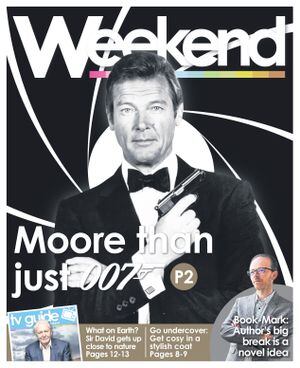
Beverley Knight told us about the importance of her mother, Deloris, and her Wolverhampton upbringing. She also spoke of her honour at being asked to return to the West End to feature in such blockbusters as The Bodyguard. “The role of Rachel is probably one of the busiest roles on any stage, but I am totally prepared for that having already done it. I know how to pace myself for the long run. I’m having even more fun with it this time around, and that’s a load of fun!”
Alastair Campbell told us he looked back on his Blair years with a sense of achievement. “I’m very happy with what I did. I was part of a good time in politics. I think we did a bl**dy good job for a long time.” He also explained his unusual routine when it comes to writing books. “I like it when I like it and I like it when I hate it. When I hate it, when I’m struggling – and with this book, I had a couple of mental blocks – then it’s a great feeling when I work through them and they go. I like that sense of struggle. I can write anywhere, trains and planes. One of the key scenes in the book was written in the bath on my phone.” And he was compellingly honest while talking about his own mental health issues. “I had a breakdown in the 1980s and have had depression on and off ever since. I’ve had one bout of psychosis and problems with drink. When I started working in politics, there were people who knew about that and were going to write about it. I could have said ‘it’s none of your business and it’s in the past blah blah blah’ but I wanted to be very open. I think that openness helps me.”
Priscilla Presley married and divorced The King of Rock’n’Roll. She has nothing but fondness for her Elvis years. “I was proud. And I’m still proud. It’s so heart warming that he is still so loved. Elvis was always concerned with keeping up with the times and in his life time that was difficult, particularly during the 1960s with The British Invasion. He was trying to find his way and there were many trials and tribulations. As an artist, he wanted to fulfil his own dreams. He was so unique in his own style, and he wanted to progress. “It’s been 40 years, but I’m still coping. He was such a big part of my life. He was there when I was 14. He was my mentor, my God, my confidant, my husband. To lose that, to lose that influence that he had on a younger girl’s life, was very difficult. It took a long time to adjust after his death. Even though we divorced we remained so close. He never left my life, he was always there.”
Lulu explained why it’s better to be an old star than a young one. “I love it. You know I love it. This is what I live for. I always knew this is what I was made for. It’s what I do. It’s very gratifying that so many people want to see me and it makes me feel quite humble. When I was a teenager starting my career, I was always breathing very shallow. I was very excited and nervous. Now it’s very different. It’s a bit more serene. I have my feet on the ground and I’m sitting in the pocket these days. I’m more in the moment. In the past, I was always running ahead. And while I still think ahead, these days things are very different.” She also told us how was glad the music had stayed with her, even though men had come and gone. “I say sometimes on stage, when it comes up, that the men have come and gone but the music has gone on and on. It’s great to be able to stay that because I say that with a smile. There’s no agenda or bitterness. It’s tongue-in-cheek. It’s just the way of life. Of course there are sacrifices you make when you have a career like mine, you have to. You go through the discovery of how sad or upsetting or frustrating those sacrifices are. But I’ve learnt to live more in the moment, not the past or the future. I don’t regret the things I cannot change.”

It’s a toss-up to decide the most out-there celebrity who’s graced the walls of Weekend Towers. John Lydon is close to the title, though, ultimately, he’s pipped to the crown by the absolutely, gob-smackingly, mind-bendingly, eye-poppingly Brill.I.Ant. SHAUN RYDER. Drugs are off limits – because he prefers a good sleep. “As soon as I’m off stage, I’m gone, back to the hotel. I put the news on. The first time it happened, I was f***ing around. These days, I’m gone. I like to get home so I can be dad.” He painted a colourful picture of Manchester in the 1970s and 1980s: “Manchester was great, you know. I started work in Manchester in 1978 and it was still pretty much Victorian. It was black and white. I was a messenger at the post office and I’d go into the pubs to watch strippers and have a pint at dinner time. Then we’d watch Bernard Manning at some club. It was like an episode of The Sweeney. Then the 80s came in and telecoms changed everything. The city became technicolour. At first, it was all docks. Now, it’s media city.” He didn’t go to rehab to kick the drugs – he bought a pushbike. “I’d done rehab but it didn’t work for me. Eventually I did it because I wanted to. I did it on my pushbike. I was out every day from 8am to 9pm on my pushbike getting off the drugs. That’s how I got straight. I was in the Peak District. I was riding all over the place.” He pulled no punches on the drug years. “I was a smack head, really. The crack sort of came on after the heroin. But I’d do pretty much anything. I’d just get off my head.”

